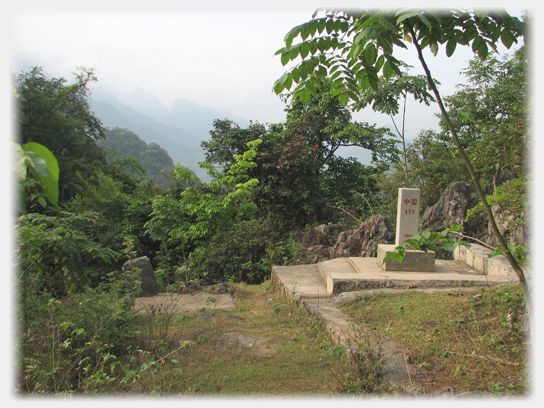
|
Horizons - Boundaries
Horizons offer boundaries. They place rings around us and in doing so give hope that entices us with the possibilities that lie hidden outside the circle. Out there, beyond our horizon, there is instant scope for fantasy, we are free to project as we wish, this lends to the horizon its charm; offering an invitation to travel, a gate to new intangible places with imagined benefits that fulfil our needs, hopes and expectations.
Boundaries matter so much to us: distinguishing my emotions from yours, disentangling related concepts, scenes of neighbours squabbling over fences, or kingdoms like Norway and Poland fighting over "...a little patch of ground / That hath in it no profit..." Boundaries are critical and run deep. But boundaries are as insubstantial as horizons: matters of public language and agreement. In the picture above is shown a marker between two countries which, over millennia, have often warred about the line between them, a line nowhere to be seen. We project across such boundaries our fantasies - maybe of the vile nature of our neighbours - yet let alone the fantasies, the very line is imaginary.
This imaginary line, like a horizon, often has no concrete embodiment, but is the place where the known meets the foreign, like a cusp in geometry, the curve of the known landscape before us swoops down and then up to the horizon, there to meet an unknown curve beyond. This cusp has an even more fundamental place in the architecture of consciousness than the examples of the last paragraph. The growth point of consciousness, the fertilisation of its conceptual eggs, is this cusp where the foreign meets the known. This is the point of revelation and fascinates us today, just as it has always fascinated humans because it is at the heart of consciousness, the way consciousness grows and develops from its 'very first flickerings', through to its reflexive comprehension of those 'very first flickerings'.
We add to our familiar landscapes with new territories from over the horizon. On reaching the border-marker of the picture - or any horizon - we find the earth stoically indifferent to such abstractions; so new concepts arrive in consciousness, homogeneous with the ideas to which they are adjacent. Because there are no lines, and only harmony on the ground at our feet, we sometimes just assume that all out there, over any border, must be similar, and foreign lands become shaped by what we know: our stereotypes take over. At such times the process is imperialist for we fail to see the extent of differences between old and new concepts; treating the new as a mere species of the old - which they may, or may not, be.
Many spheres of life allow us to exercise sway over new territory. Notable among these are archaeology with its talent for letting its exponents freely create social worlds of their choosing. Probably outstanding, in the game of fantasising about what lies beyond the boundary or horizon of thought, is religion. Religions have vocabularies and panoplies of conceptualisations about the grandest and most abstract ideas concerning what may lie out there. Secular writers are poorly endowed by comparison, often not even able to praise wonder or grandeur, vastness or splendour. But when a god, or ineffable being, is announced then hyperbole seems only natural. It must be hyperbole, for no one suggests that those without the 'comforts of religion' have any the less rich material evidence, indeed the 'godless' are accused of ignoring all the evidence god has placed in front of them, so they stand as much in the shadow of wonder as those who offer an account of that wonder in theological terms.
At the heart of consciousness lies the conversion of the unknown to the known. This is the point where cultural heritage and social exchange, with our fears, fantasies and hopes, meet. It is a cusp, a notional point, where no line can be seen, but where everything may change. This is the horizon and the boundary of our lands.
References
- Shakespeare 'Hamlet' IV iv 18
6th July 2015 ~ 19th July 2015